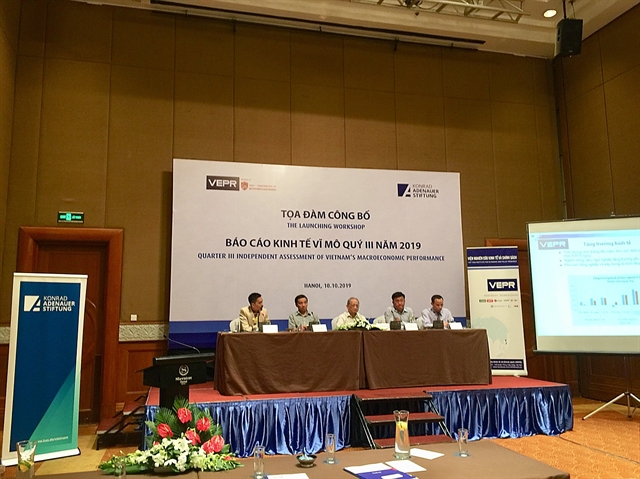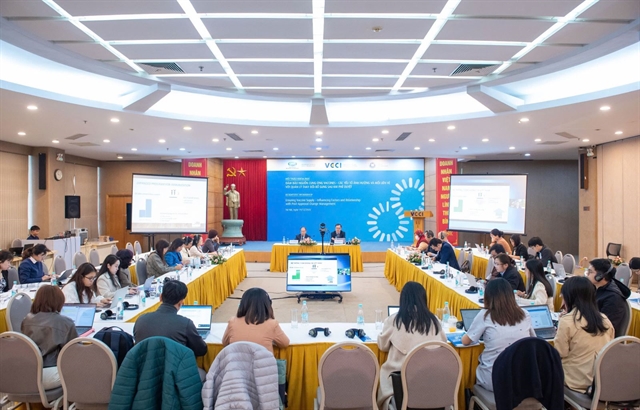 Economy
Economy


|
| Participants at the launching workshop themed “Quarter III Independent assessment of Việt Nam’s macroeconomic performance”, held by the Việt Nam Institute for Economic and Policy Research (VEPR) in Hà Nội on Thursday. — VNS Photo Linh Anh |
HÀ NỘI — Việt Nam's economic growth is forecast to reach 7.26 per cent in the fourth quarter and 7.05 per cent for the whole year of 2019.
The information was released at a workshop themed ‘Quarter III Independent assessment of Việt Nam’s macro-economic performance’, held by the Việt Nam Institute for Economic and Policy Research (VEPR) in Hà Nội on Thursday.
In the third quarter of this year, Việt Nam’s economy grew at 7.31 per cent. The figure was 6.98 per cent in the first nine months, said Phạm Thế Anh, VEPR's chief economist.
In the first nine months of 2019, the service sector grew by 6.85 per cent, agriculture, forestry and fishery increased by 2.02 per cent, while industry and construction climbed by 9.56 per cent. The Industrial Production Index (IPI) rose by 9.6 per cent, the consumption index of the manufacturing and processing sector increased by 9.5 per cent, he said.
Regarding enterprises, in Q3, there were 35,316 newly registered enterprises with total registered capital of VNĐ430.6 trillion (US$18.4 billion), up 37 per cent year-on-year. The number of enterprises suspending operations continued to decrease to 12,505.
CPI in Q3 increased by 2.23 per cent year-on-year, the figure for nine months was 2.5 per cent, but there is a high risk of rising inflation with increases in food prices due to epidemics, as well as increasing education fees and energy prices, Thành said.
The VNĐ/USD exchange rate at commercial banks fluctuated while the central exchange rate increased slightly. The exchange rate at commercial banks fluctuated around VNĐ23,275 per USD.
Total State budget revenue in the first six months was estimated at VNĐ1.1 trillion, equalling 77.5 per cent of the yearly estimate and up 10.1 per cent over the same period in 2018.
In six months, total budget expenditure was estimated at VNĐ1 trillion, equalling 63.1 per cent of the yearly estimate, up 3.8 per cent year-on-year.
According to Thế Anh, Việt Nam’s GDP growth in the third quarter stood in contrast to the global trend.
During Q3, the growth rates slowed down in many economies.
The US economy decelerated so the US Federal Reserve (Fed) cut its interest rate twice in Q3. European economies enervated, thus the ECB also had to reduce interest rates. Meanwhile, Japanese government has been attracting foreign workers to compensate their labour shortages.
There are increasing concerns about China’s economy due to its slower economic growth and the reducing power of the yuan. Besides, China’s PMI was under 50 while growth-enhancing packages were no longer effective.
In addition, oil prices fluctuated unpredictably owing to trade tension between US-China, Japan-Korea and a recent attack on the world’s largest oil refinery in Saudi Arabia.
The economic growth in ASEAN countries decelerated. Thailand offers preferential packages to attract companies that want to move production out of China.
Most central banks of these countries cut interest rates to spur growth, Thế Anh said. — VNS




